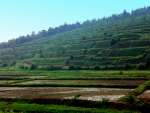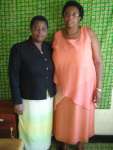Kamanzi Jean Baptiste & Ngango Jean Bosco
Kamanzi Jean Baptiste tells the story of his life's hardships to his younger brother, Ngango Jean Bosco, who has not lived through such times as he has. Kamanzi Jean Baptiste shares with his brother details about his life such as how he joined the army because of abuse and hunger at home, or how he became handicapped and still decided to go to school at the age of 22 with peers who were 12 years old. Ngango Jean Bosco listens to his brother’s words and continues to ask more questions to which Kamanzi Jean Baptiste is happy to answer.
Uwamahoro Ernestine & Uwimana Deogratias
Uwimana Deogratias is curious about the level of education in Rwanda, and he hopes his elder, Uwamahoro Ernestine, can give him more knowledge on the topic. He was concerned with how uneducated the older generation is, so Uwamahoro Ernestine explains how difficult it was to study during her youth. Comparing the days of her youth when it was rare to see anyone pass their education to today when even those with university degrees may not be guaranteed employment, the times have changed immensely.
Kantarama Peace & Mukamana Marie Joie
Kantarama Peace’s daughter, Mukamana Marie Joie, is confused about marriage. She asks her mother, a member of a mother’s union who has helped many girls and given them advice, numerous questions. Kantarama Peace emphasizes never to give up when it comes to love, because as long as its for love, anyone can achieve success.
Nsengimana Jean Paul & Hitimana Jean de Dieu
Nsengimana Jean Paul has changed his religion as an older man, but recalls the old prayers and rituals from when he was younger. He explains to Hitimana Jean de Dieu about witch doctors, night dancers, and how to properly please the gods for good fortune, and describes his encounters with devils that made him turn to the gospel.
"You pray to the God you know, you understand, and in good order. It is clear that if you ask you will receive, if you knock the door they will open for you, if you look for you will get." Nsengimana Jean Paul
Kabandana Louis & Nkusi Faustin
Kabandana Louis and Nkusi Faustin have different reasons to explain why elders and youths no longer share stories, histories, and proverbs. Yet they also discover both sides might be much more willing to talk than they thought. They discuss the growing equality for women and how important it is to remember the past even if new ways might be better. Kabandana Louis talks of female soldiers, folklore fears, and the impact technology has on Rwandese oral culture.








